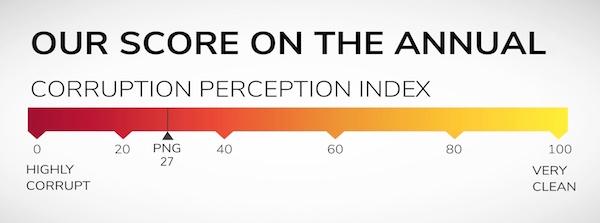
Papua New Guinea’s international corruption rating has slipped a further one-point, from 28 to 27, in the latest figures released by Transparency International.
This is bad news for the economy and a sad reflection on the state of our democracy says ACT NOW! campaign manager Eddie Tanago.
“Research shows that a one-point drop in our corruption score will on average cost the nation over K10 billion in economic growth. It also negatively affects our credit rating which makes it harder and more expensive for the government to borrow. A smaller economy and less borrowing mean reduce government revenues and even less spending on essential services like health, education and transport infrastructure”.
Before the latest figures, PNG was already the worst ranked country for corruption in the Asia-Pacific region and has now slipped a further 5 places to be 142nd in the world. PNG sits alongside Uganda and Angola in the ranking and below countries like Liberia, Myanmar and Paraguay. PNG is ranked 64 places lower than the Solomon Islands, 40 places lower than Indonesia, and 27 places below the Philippines.
ACT NOW says PNG’s continuing decline in the annual ranking reflects the fact that while the government talks up its corruption fight, we have yet to see any results in terms of corrupt deals reversed or successful prosecutions.
“The passage of the ICAC legislation was an important step, but despite numerous expensive corruption investigations and inquires into major scandals corruption is still flourishing because nobody is ever held accountable” says Eddie Tanago.
“The government has also broken its promise to release the APEC spending audit and has brushed the Manumanu scandal under the carpet”.
ACT NOW’s estimate of the economic cost of corruption is based on the research of global financial services company, Price Waterhouse Coopers.
WATCH THE SHORT VIDEO - THE ECONOMIC COSTS OF CORRUPTION
PWC has estimated that a one-point change in perceived corruption levels will on average decrease a country’s GDP by US$380 per capita. For PNG, with a population of over 8 million, this is equivalent to US$3 billion or K10 billion.
The costs of corruption though are not just economic. Corruption erodes democracy by undermining the effectiveness of government departments, service delivery and accountability. It undermines people's trust in the political system in its institutions and its leadership. It also leads to environmental degradation and land grabbing.
“Corruption impacts societies in a multitude of ways", says Eddie Tanago. “In the worst cases, it costs people their lives. It can also cost them their health, education, freedom and money. It can destroy families and communities, and undermine our cultures.”
ACT NOW! is urging the government to introduce a full suite of measures to improve government transparency and accountability as outlined in its Policy Proposals.
